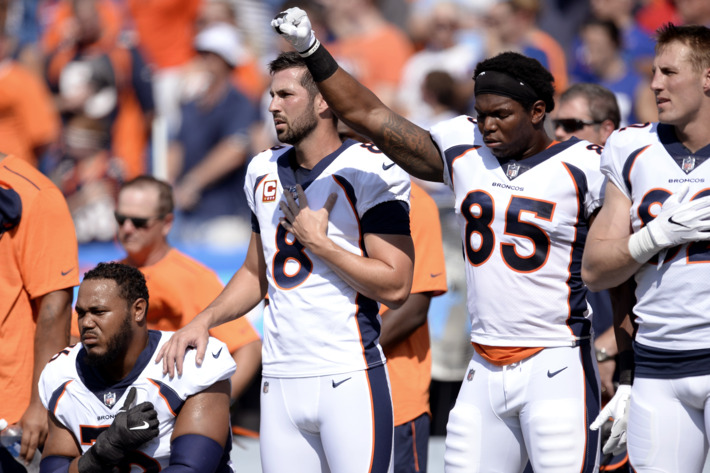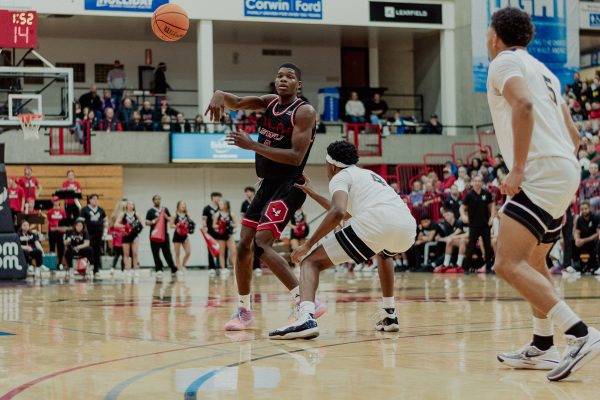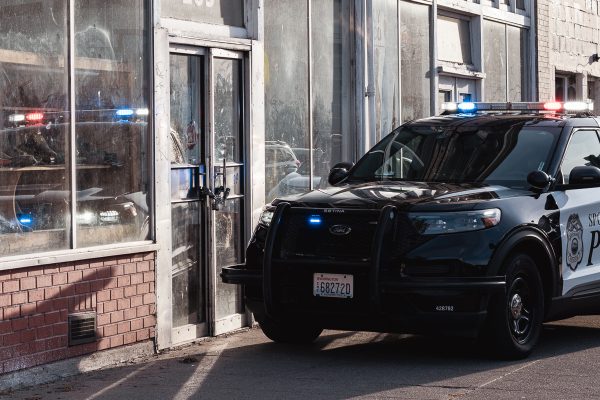To kneel or not to kneel?
Denver Broncos tight end Virgil Green raises his fist in the air during the national anthem. | Photo courtesy of AP’s Adrian Kraus
September 29, 2017
That is the question many Americans across the United States are asking themselves. It is a debate that began in August 2016. The question has sparked an intense conversation, one that is divisive in nature. So, to kneel or not to kneel? To answer that question, we first must address what exactly is going on.
During the 2016 NFL preseason, then San Francisco 49ers quarterback Colin Kaepernick decided to protest racial inequality by refusing to participate in the national anthem in pregame festivities. He protested in the form of sitting while the anthem played, but then changed course after talking with former NFL player and veteran Nate Boyer and switched to kneeling.
Almost instantaneously, Kaepernick became the most polarizing figure in sports. Swaths of fans called for Kaepernick’s termination from the NFL, claiming the six-year veteran’s actions were unpatriotic and a disgrace to the American flag and its military members.
Kaepernick’s anthem protest was apart of a personal social reawakening in which he vowed to fight against the systematic maltreatment of colored individuals.
“I am not going to stand up to show pride in a flag for a country that oppresses black people and people of color,” Kaepernick told NFL Network Media in an interview after the August 2016 game. “To me, this is bigger than football and it would be selfish on my part to look the other way. There are bodies in the street and people getting paid leave and getting away with murder.”
Soon after Kaepernick’s protest, other NFL players joined. A few from his own 49ers team did, like safety Eric Reid. But in all, the player movement behind Kaepernick wasn’t that powerful. Yes he did have support from others, yet some were fearful of the backlash they would face like Kaepernick was experiencing.
While recently that has seemed to be changing, as more and more professional athletes are becoming more open with their beliefs, this past weekend saw an explosion of activism from the player side. It all started with remarks made by President Trump.
At a rally on Sept. 22 in Huntsville, Alabama, President Trump proclaimed his dislike of the anthem protests.
“Wouldn’t you love to see one of these NFL owners when somebody disrespects our flag to say get that son of a bitch off the field right now, out, he’s fired, he’s fired,” Trump said to the crowd.
Yes, the sitting president of the United States did indeed refer to those participating in a peaceful protest as a ‘son of a bitch’ and advocated for the termination of their employment.
President Trump then proceeded to double down on his stance, taking to Twitter to further solidify what he meant:
“If a player wants the privilege of making millions of dollars in the NFL,or other leagues, he or she should not be allowed to disrespect our Great American Flag (or Country) and should stand for the National Anthem. If not, YOU’RE FIRED. Find something else to do!” Trump posted in a series of two tweets on Sept. 23.
Among the common arguments used against those who opt to protest during the national anthem, the most popular are:
—It is disrespectful to the American flag and/or the United States itself.
—It shows zero admiration for those in service, whether it be in the military or law enforcement.
First, if merely kneeling or sitting during the national anthem is considered disrespectful, than does that mean the people who are at home watching the game on the couch and don’t stand up are being disrespectful too? Seriously, how many people actually stand for the national anthem at home?
And if we are talking about ACTUALLY disrespecting the flag, then very few of us are innocent. Tell me, did you know that right now you are probably in violation of the US flag code?
US Flag Code Chapter 10.176D states that, “The flag should never be used as wearing apparel, bedding, or drapery.”
US Flag Code Chapter 10.176I states that, “The flag should never be used for advertising purposes in any manner whatsoever. It should not be embroidered on such articles as cushions or handkerchiefs and the like or otherwise impressed on paper napkins or anything that is designed for temporary use and discard.”
US Flag Code Chapter 10.176J states that, “No part of the flag should ever be used as a costume or athletic uniform.”
So before you go on disparaging these players, check yourself first.
Second, attempting to claim the national anthem protests are a slap in the face to those who have served the United States in the military or law enforcement is downright ignorant. These protests are a testament to the exact rights they fought for while in uniform — American citizens’ right to free speech and protest are some of its greatest values.
To claim this is to also ignore the information staring at you right in the face. Time and time again, military veterans have come out in support for those protesting. From notable veterans like Jesse Ventura to lesser-known ones like John Middlemass, there is a cluster of support from those who have served.
In the words of Eric Reid, this is not about the military.
“It baffles me that our protest is still being misconstrued as disrespectful to the country, flag and military personnel,” Reid wrote in a Sept. 25 The New York Times Op-Ed. “We chose it because it’s exactly the opposite. It has always been my understanding that the brave men and women who fought and died for our country did so to ensure that we could live in a fair and free society, which includes the right to speak out in protest. It should go without saying that I love my country and I’m proud to be an American. But, to quote James Baldwin, ‘exactly for this reason, I insist on the right to criticize her perpetually.’”
We at The Easterner stand with these players and their first amendment rights. The notion of free speech is a supremely important ideal to us at the newspaper. Without that right, our very existence is threatened. This is not a police state where authoritarian values rule the land. You are allowed to say as you wish, without fear of prosecution.
The moment we start to allow any kind of censorship is the moment when we lose our true freedom. No one should be afraid to advocate for equality because they are frightened at the prospects of losing their job.
That’s not what this country is about.






![Simmons said the biggest reasons for her success this year were “God, hard work, and trusting [her] coach and what she has planned.”](https://theeasterner.org/wp-content/uploads/2024/05/image1-1-1200x800.jpg)


![Simmons said the biggest reasons for her success this year were “God, hard work, and trusting [her] coach and what she has planned.”](https://theeasterner.org/wp-content/uploads/2024/05/image1-1-600x400.jpg)






